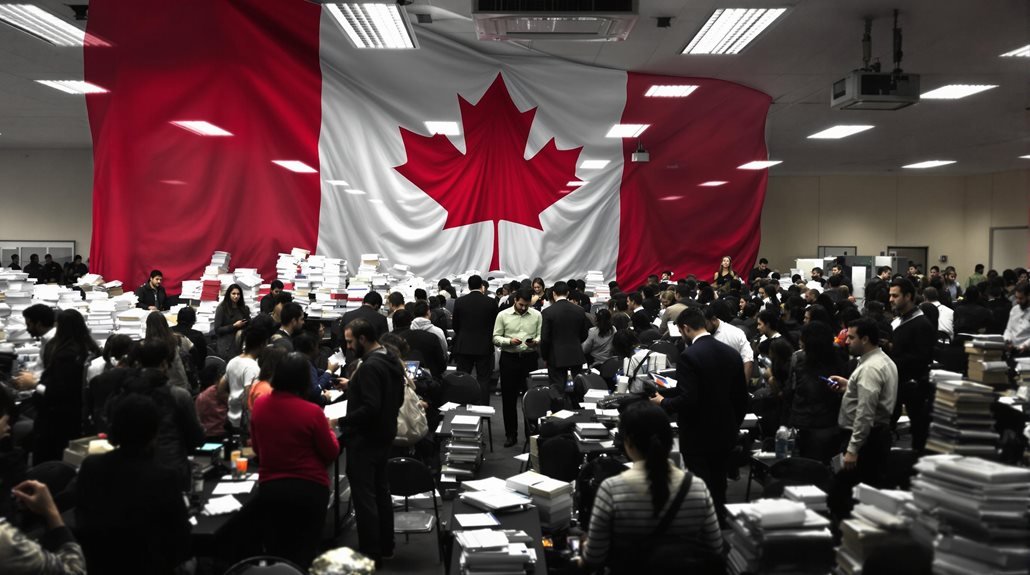The recent decision by Immigration, Refugees and Citizenship Canada to reduce its workforce by 25% raises significant concerns. This staffing cut is projected to exacerbate existing visa backlogs and prolong processing times for citizenship and permanent residency applications. Families seeking reunification and businesses relying on skilled workers may face greater challenges. As the implications unfold, stakeholders are left to ponder the broader effects on Canada's immigration landscape and its economic importance.
Overview of IRCC Workforce Reductions
The impending reduction of the Immigration, Refugees and Citizenship Canada (IRCC) workforce stands as a significant precursor to changes in the visa processing landscape.
This decision, reflecting a broader federal workforce strategy aimed at reverting to pre-pandemic spending levels, will see approximately 3,300 positions—around 25% of the staff—cut by 2027.
Such substantial reductions amplify existing staffing challenges within the agency, jeopardizing its capacity to manage immigration processes efficiently.
With temporary contract terminations and short-term adjustments anticipated, these workforce changes signal a critical juncture for the IRCC, raising questions about the future of Canada's immigration system and its inherent freedoms.
Anticipated Impact on Visa Processing Times
Significant reductions in the IRCC workforce are poised to severely strain visa processing times, exacerbating existing delays in the system.
The anticipated impact on applicants can be characterized by the following:
- Increased visa delays, particularly for citizenship and permanent residency.
- Heightened processing challenges for families seeking reunification, impacting emotional well-being.
- Critical shortages in skilled labor, affecting businesses and the economy.
As workforce cuts take effect, applicants may find themselves maneuvering a lengthened timeline, underscoring the need for proactive measures and awareness of evolving immigration circumstances.
The resulting strain could reverberate across various sectors reliant on timely immigration decisions.
Changes to Immigration Targets and Limits
Although immigration is often viewed as an essential component of Canada's economic and social landscape, recent modifications to the Immigration Levels Plan signal a shift that may have profound implications.
The government has lowered permanent residency targets to 395,000 in 2025, 380,000 in 2026, and 365,000 in 2027, a significant departure from the previous goal of 500,000. These target adjustments aim to address housing shortages and infrastructure pressures but raise considerable immigration implications.
As the government revises its approach, stakeholders must navigate the potential consequences on labor markets and community cohesion, straddling the line between necessity and opportunity amidst reduced numbers.
Backlogs and Advocacy Group Concerns
Amidst the backdrop of impending workforce reductions at the IRCC, concerns regarding visa backlogs have reached a new intensity among advocacy groups.
The anticipated cuts have prompted organizations to revise their advocacy strategies and galvanize community support, focusing on the following areas:
- Increased Delays: Anticipated processing bottlenecks will hinder timely approvals.
- Economic Impact: Families and businesses may suffer from unmet workforce needs.
- Policy Reevaluation: Calls for immediate review of immigration policies are growing louder.
These developments suggest a cascading effect on Canada's immigration system, amplifying the urgency for cohesive responses from both stakeholders and policymakers.
Implications for Families and Businesses
As Canada faces increasing visa backlogs due to workforce reductions at the IRCC, the implications for families and businesses are becoming increasingly pronounced.
Families seeking reunification will confront protracted waits, intensifying emotional strain and uncertainty.
Concurrently, businesses reliant on efficient recruitment of skilled workers may struggle to fill critical roles, hampering growth and productivity.
The healthcare sector, in particular, faces exacerbated labor shortages, undermining its ability to deliver essential services.
Ultimately, these challenges not only disrupt individual lives but also threaten broader economic stability, highlighting the urgency of addressing the burgeoning visa processing issues facing the nation.
What Applicants Should Expect
While the Canadian immigration landscape undergoes significant changes, applicants should brace themselves for extended processing times across various visa categories.
In light of workforce reductions, they can expect:
- Increased processing delays for citizenship and permanent residency applications.
- Greater importance placed on application preparedness to mitigate risks of further delays.
- A heightened emphasis on documentation accuracy to guarantee submissions meet requirements.
With potential backlogs looming, individuals are urged to submit applications early and verify their documents meticulously.
Awareness of IRCC policies will be vital in maneuvering this evolving environment and achieving immigration objectives amidst uncertainty.
How can applicants effectively manage the anticipated delays in visa processing? Proactive planning is imperative in this evolving context.
Applicants should submit their applications early, which can alleviate timing pressure and mitigate the consequences of possible backlogs.
Ensuring documentation accuracy is essential; incomplete or incorrect submissions can lead to further delays.
Monitoring IRCC policy changes will provide critical insights into processing timelines and requirements.
Additionally, applicants might consider seeking guidance from immigration consultants to navigate complexities.
Frequently Asked Questions
Will the Cuts Affect Staff Training and Resources for Applicants?
The impending workforce cuts are likely to negatively impact staff morale and undermine training programs. This decline may hinder the development of efficient processes, further complicating applicants' experiences within the increasingly strained immigration system.
How Will These Changes Influence Immigration Consultant Services?
The impending changes will compel immigration consultants to adapt their strategies, driven by heightened market demand. As processing delays escalate, consultants must enhance services, fostering client trust while traversing an increasingly complex immigration landscape.
Are Specific Visa Categories More Prone to Delays Than Others?
Certain visa categories, particularly student visas and family sponsorships, appear more susceptible to processing delays due to their complexity and high demand, potentially leaving applicants facing greater uncertainty amid evolving immigration policies and workforce reductions.
What Support Is Available for Distressed Applicants During This Period?
During this period, distressed applicants can access emotional support through counseling services and community groups, while financial aid may be available via government programs and non-profits, assisting individuals in managing the complexities of immigration challenges effectively.
Can Applicants Appeal Processing Delays or Decisions Made by IRCC?
Applicants facing processing delays can utilize the appeal process for contesting decisions. A decision review may provide an opportunity to rectify issues, ensuring all avenues for resolution are thoroughly explored in the immigration framework.
